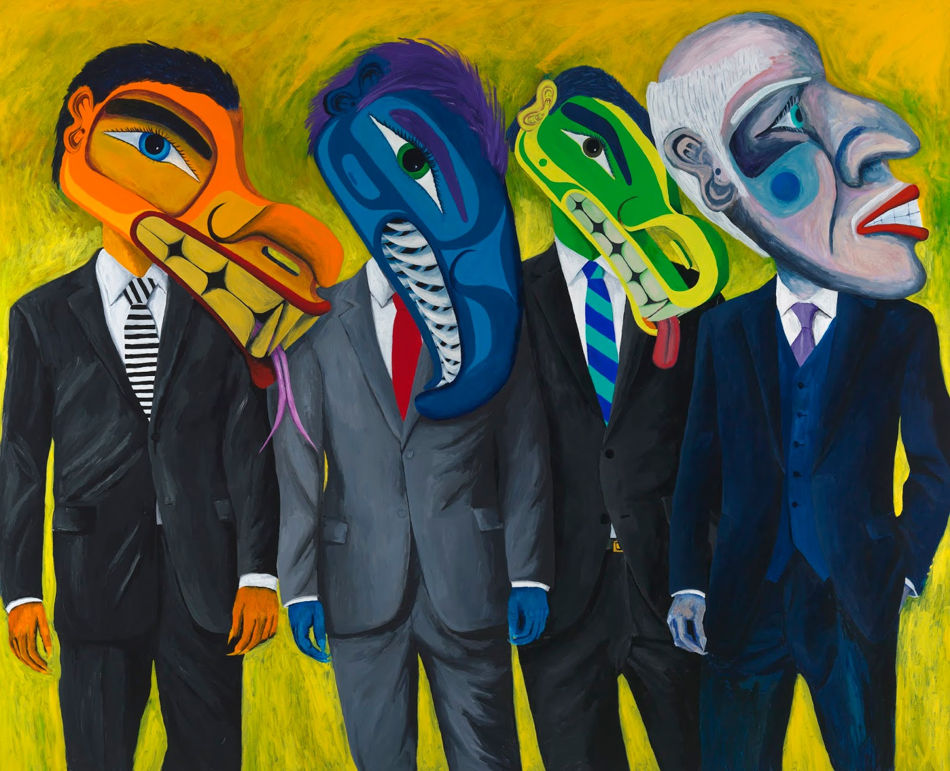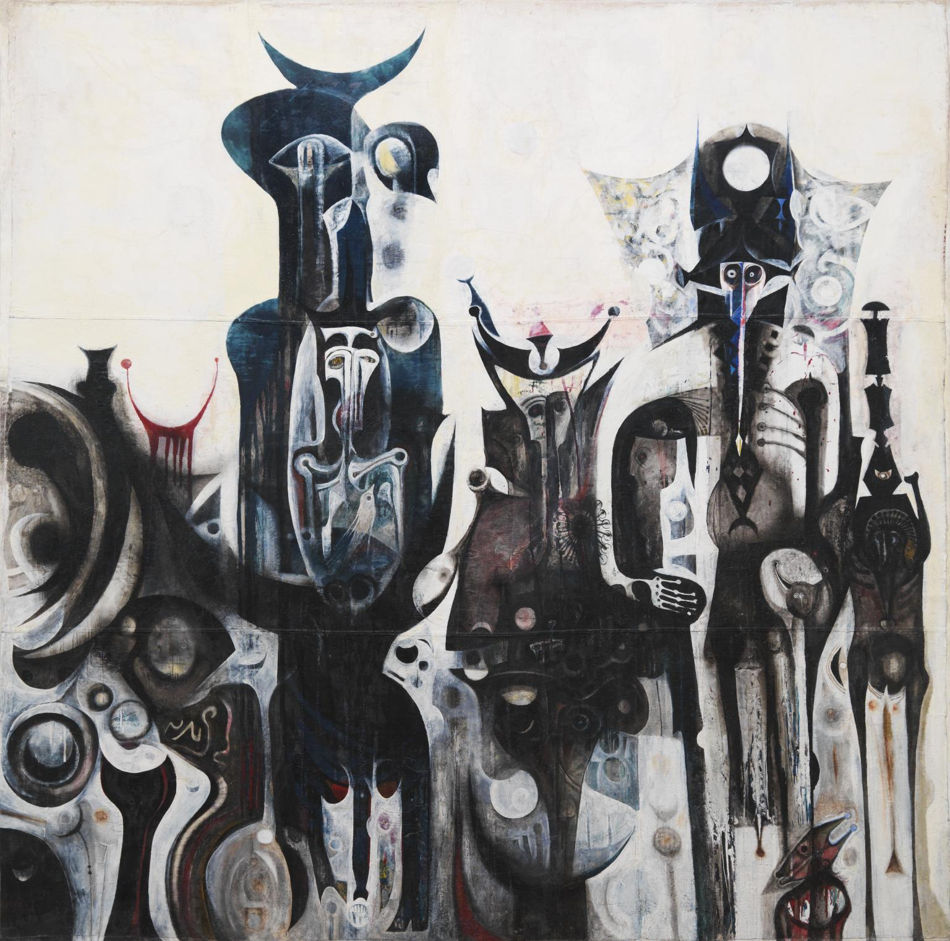Vijay Prashad presents six theses about the establishment of the U.S.-shaped world order in 1990 and its current fragility in the face of growing Russian and Chinese power.

Chiharu Shiota, Japan, “Navigating the Unknown,” 2020.
Tricontinental: Institute for Social Research
 The war in Ukraine has focused attention on the shifts taking place in the world order. Russia’s military intervention has been met with sanctions from the West as well as with the transport of arms and mercenaries to Ukraine. These sanctions will have a major impact on the Russian economy as well as the Central Asian states, but they will also negatively impact the European population who will see energy and food prices rise further. Until now, the West has decided not to intervene with direct military force or to try and establish a ‘’no-fly zone.’
The war in Ukraine has focused attention on the shifts taking place in the world order. Russia’s military intervention has been met with sanctions from the West as well as with the transport of arms and mercenaries to Ukraine. These sanctions will have a major impact on the Russian economy as well as the Central Asian states, but they will also negatively impact the European population who will see energy and food prices rise further. Until now, the West has decided not to intervene with direct military force or to try and establish a ‘’no-fly zone.’
It is recognized, sanely, that such an intervention could escalate into a full-scale war between the United States and Russia, the consequences of which are unthinkable given the nuclear weapons capacities of both countries. Short of any other kind of response, the West – as with the Russian intervention in Syria in 2015 – has had to accept Moscow’s actions.
To understand the current global situation, here are six theses about the establishment of the U.S.-shaped world order from 1990 to the current fragility of that order in the face of growing Russian and Chinese power. These theses are drawn from our analysis in dossier no. 36 (January 2021), “Twilight: The Erosion of US Control and the Multipolar Future.” They are intended for discussion and so feedback on them is very welcome.

Lawrence Paul Yuxweluptun, Canada, “The One Percent,” 2015.
Thesis One: Unipolarity. Following the fall of the Soviet Union, between 1990 and 2013–15, the United States developed a world system that benefitted multinational corporations based in the United States and in the other G7 countries (Germany, Japan, the United Kingdom, France, Italy and Canada). The events that defined overwhelming U.S. power were the invasions of Iraq (1991) and Yugoslavia (1999) as well as the creation of the World Trade Organization (1994). Russia, weakened by the collapse of the U.S.S.R., sought entry into this system by joining the G7 and collaborating with the North Atlantic Treaty Organisation (NATO) as a “Partner for Peace.” Meanwhile, China, under presidents Jiang Zemin (1993–2003) and Hu Jintao (2003–2013), played a careful game by inserting its labor into the U.S.-dominated global system and not challenging the U.S. in its operations.
Thesis Two: Signal Crisis. The U.S. overreached its power through two dynamics: first, by overleveraging its own domestic economy (overleveraged banks, higher non-productive assets than productive assets); and second, by trying to fight several wars at the same time (Afghanistan, Iraq, Sahel) during the first two decades of the 21st century. The signal crises for the weakness of U.S. power were illustrated by the invasion of Iraq (2003) and the debacle of that war for U.S. power projection, and the credit crisis (2007–08). Internal political polarization in the U.S. and a crisis of legitimacy in Europe followed these developments.

Olga Bulgakova, Russia, “Blind Men,” 1992.
Thesis Three: Sino-Russian Emergence. By the second decade of the 2000s, for different reasons, both China and Russia emerged from their relative dormancy.
China’s emergence has two legs:
- China’s domestic economy. China built up massive trade surpluses and, alongside these, itbuilt up scientific and technological knowledge through its trade agreements and its investment in higher education. Chinese firms in robotics, high-tech, high-speed rail and green energy leapfrogged over Western firms.
- China’s external relations. In 2013, China announced the Belt and Road Initiative (BRI), which proposed an alternative to the U.S.-driven International Monetary Fund’s development and trade agenda. The BRI extended out of Asia into Europe as well as into Africa and Latin America.
Russia emerged on two legs as well:
- Russia’s domestic economy. President Vladimir Putin fought some sections of the large capitalists to assert state control of key commodity export sectors and used these to build up state assets (notably oil and gas). Rather than merely leech Russian assets for their overseas bank accounts, these Russian capitalists agreed to subordinate part of their ambitions to rebuilding the power and influence of the Russian state.
- Russia’s external relations. Since 2007, Russia began to edge away from the Western global agenda and drive its own project, first through the BRICS (Brazil-Russia-India-China-South Africa) agenda and then later through increasingly close relations with China. Russia leveraged its export of energy to assert control of its borders, which it had not done when NATO expanded in 2004 to absorb seven countries that are near its western boundary. Russian intervention into Crimea (2014) and Syria (2015) used its military force to create a shield around its warm water ports in Sebastopol (Crimea) and Tartus (Syria). This was the first military challenge to the U.S. since 1990.
In this period, China and Russia deepened their cooperation in all fields.

Ibrahim el-Salahi, Sudan, “Reborn Sounds of Childhood Dreams I,” (1961-65).
Thesis Four: Global Monroe Doctrine. The United States took its 1823 Monroe Doctrine (that asserted its control over the Americas) global and proposed in this post-Soviet era that the entire world was its dominion. It began to push back against the assertion of China (Obama’s Pivot to Asia) and Russia (Russiagate and Ukraine). This New Cold War driven by the U.S., which includes hybrid warfare through sanctions against 30 countries such as Iran and Venezuela, has destabilized the world.
Thesis Five: Confrontations. The confrontations hastened by the New Cold War have inflamed the situation in Asia – where the Taiwan Strait remains a hot zone – and in Latin America – where the United States attempted to create a hot war in Venezuela (and attempted but failed to project its power in places such as Bolivia). The current conflict in Ukraine – which has its origins in many factors, including the demise of the Ukrainian plurinational compact – is also over the question of European independence. The U.S. has used “Global NATO” as a Trojan horse to exercise its power over Europe and keep it subordinated to U.S. interests even if it harms Europeans as they lose energy supply and natural gas for the food economy. Russia violated the territorial sovereignty of Ukraine, but NATO created some of the conditions which accelerated this confrontation – not for Ukraine but for its project in Europe.

Olga Blinder, Paraguay, “A mi maestra” or “To My Teacher,” 1970.
Thesis Six: Terminal Crisis. Fragility is the key to understanding U.S. power today. It has not declined dramatically, nor does it remain unscathed. There are three sources of U.S. power that are relatively untouched:
(1) Overwhelming Military Power. The United States remains the only country in the world that is able to bomb any of the other UN member states into the Stone Age.
(2) The Dollar-Wall Street-IMF regime. Due to the global reliance on the dollar and to the dollar-denominated global financial system, the U.S. can wield its sanctions as a weapon of war to weaken countries at its whim.
(3) Informational Power. No country has as decisive control over the internet, both its physical infrastructure and its near monopoly companies (such as Facebook and YouTube, which remove any content and any provider at will); no country has as much control over the shaping of world news due to the power of its wire services (Reuters and the Associated Press) as well as the major news networks (such as CNN).
There are other sources of U.S. power that are deeply weakened, such as its political landscape, which is deeply polarized, and its inability to marshal its resources to send China and Russia back inside their borders.
People’s movements need to grow our own power, by organizing the people into powerful organizations and around a program that has the capacity to both answer the immediate problems of our time and the long-term question of how to transition to a system that can transcend the apartheids of our time: food apartheid, medical apartheid, education apartheid and money apartheid. To transcend these apartheids leads us out of this capitalist system to socialism.
Vijay Prashad, an Indian historian, journalist and commentator, is the executive director of Tricontinental: Institute for Social Research and the chief editor of Left Word Books.
This article is from Tricontinental: Institute for Social Research.
The views expressed are solely those of the author and may or may not reflect those of Consortium News.

I thought this article was well written until I reached the last paragraph which struck me as discordant and completely irrelevant to the main dialogue. The last sentence was especially egregious.
“To transcend these apartheids leads us out of this capitalist system to socialism.”
What does he mean by this statement and how does it fit in with the six theses outlined? What does he mean by capitalist system or socialism? If he meant “crony capitalism” (which would have been a better fit), then he should have said so. In addition, socialism, to one degree or another, has been the dominant theme in a large part of the world for more than a century and has resulted in an enormous loss of life and destruction of property.
China, since Richard Nixon’s historic venture to open it up for business, has increasingly moved away from socialism toward capitalism. Those who lived through the dark days of Mao’s excesses to force “socialism” on everyone could be forgiven for preferring the current regime of state-controlled “capitalism”. Why would they want to go back? Don’t rock the boat, baby!
There is more than enough food in this world to feed everyone adequately, but the primary cause of famine and subsequent starvations (food apartheids) of populations is government action. It does not matter whether they are capitalist nor socialist. They all participate and contribute to the problem. Crony capitalism or corporate fascism, as we live under today, DOES result in “apartheid systems” which are repugnant, but the answer to those exclusionary regimes is not forced socialism (is there any other kind), but free-enterprise without the interference and control of governments–anarcho-capitalism, in which everyone can engage in trade with anyone voluntarily to the benefit of both parties at their own discretion.
Socialism, without the use of government force and violence, simply does not and will not work. History is replete with tried and failed examples. To believe otherwise is utopian.
Socialism existed in one degree or another in Scandinavia and other parts of the Western Europe for decades after WWII without any government force or violence.
The super wealthy elitists [the sweats] have themselves nicely insulated against pretty much everything at this point in time. Not just in the U.S. but the world over. See the IMF.
Our government is focused on somehow managing to control the world economy in any fashion the allows this world wide cabal to flourish. Just as long, that is, as the that handpicked group of bankers and money influencers, those similar in neocon views of a world order that reflects their desires and no one else’s, are on top the heap O’ cash.
Go back an examine the Bretton Woods Conference and it’s cast of elite characters that were meeting long before that conference. ( ~ early 1930’s ) This is what the likes of the Kochs are all about.
The U.S. had it’s chance at breaking the vicious cycle but failed. This fight ended for all practical intents and purposes as soon as JFK died and was robbed of his day of justice.
Given the State of American politics the lack of true leadership of the country is in the final stages of doing us in.
Look at the Citizens United SCOTUS ruling and you need to look no further. The fix is in.
Thanks CN
Regarding Thesis Six:
The problem here is context.
i. Military power: the US does not have ‘overwhelming military power’. It has, instead, ‘overwhelming military assets’. The two are not the same. The hugely expensive military assets, apart from the nuclear ones, are largely imperial baubles. The aircraft carriers, for instance, belong to the previous century and are not really fit for purpose against peer enemies. It is also foolish to pretend that the US can “bomb any of the other UN member states into the Stone Age”: in reality, it would simply run out of bombs, or – more likely – come up against the nuclear deterrents of Russia, China, NK etc. Lastly, the US cannot use its assets to any real advantage in regions far from its shores because of supply line difficulties (thus it would be defeated in a regional conventional European war with Russia).
ii. Financial system: US hegemony of the world financial system is always presented as monolithic. In reality it is a house of cards. There is no reason why the emerging multipolar players need to conform to the financial system set up for a unipolar world. And there is no reason – in a digital world – why a change can’t be effected in a few months. Already, as a result of the manufactured crisis in Ukraine, nations are trading oil/gas for yuan. NB: in this way the military/economic trap the US set for Russia in Ukraine may be revealed as a global Sino-Russian financial trap for the US.
iii. Informational power: again, there is no reason why US dominance here should be monolithic. The US may be ‘first in class’ (as a function of unipolarity in previous decades), but there is no reason why it should be ‘best in class’ for this new century. For instance, look at the progress of 5G in Asia compared to the US.
There is one other item of interest not included in the theses: branding. The American global ‘brand’ no longer stands for anything positive. This is a function of two decades of expression on the world stage of American malevolence, arrogance, decadence and selfishness and…well.. thuggishness and thievery. The US has all the polish, standing, diplomacy and statesmanship of a mafia family running a bunch of clip joints.
Cornelius completely agrees with you) Everything is really so.
You are free to express your opinion as long as it goes along publicly accepted opinions.
The energy of the universe is in a constant ebb and flow. Whenever one embarks on a project, this must be taken into account. This doesn’t mean your project follows some kind of mystical determinism.
But it does mean that you will utilize less energy when you are in synch with this pattern, and more when you are, in effect, swimming against the current.
The dominant flow of energy today is outward, centripetal, breaking up old patterns and institutions. The efforts of American foreign policy today is trying to buck that trend and force the world back into its old strictures.
That might have succeeded at an earlier point in time. But empires die from within, long before their actual power is silenced. And America is definitely dying from within, even while remaining the world’s singular superpower.
China and Russia’s view of a multipolar world is more in synch with this dynamic. And even then, only as an intermediary stage. These two forces, (US-China Russia) are pushing in opposite directions and so conflict is inevitable. What that leads to is up to human agency. And can lead to creation of something new, or it can destroy.
But global warming will soon change both trends, the consolidating and the breaking apart. We will soon see between one and two billion people dislocated by global warming, and none of the old patterns of global politics will be adequate to the challenge.
We have a very brief window of opportunity to prepare now for this eventuality. But despite all the warnings, we are squandering it.
These theses don’t give much weight to declining primary resources. Back in the “unipolarity” phase” (thesis one), after the fall of the USSR, there were plenty that saw the potential threat to that unipolarity from both an emerging China (vast manpower) and a re-emerging Russia (vast resources). As per the so-called Project for a New American Century, control over central Asian resources was forseen as the main avenue by which both USA could complete it’s global imperial expansion during the present century and Europe could survive as a globally important supporting bloc. Hence the otherwise shockingly single-mindedness with which the NATO powers and their media backers have backed the confrontation over Ukraine.
Very compressed and very accurate explanation of American foreign policy and decline in power.
Can someone tell me why a simple statement that America is no longer a super power is censored, or why these these so-called “impartial “web sites only allow ” half facts,”. Is it money, threats or both?
The rich and powerful, who own the web infrastructure and operating systems, want to control your image, model or conception of the real world. Why? So as to constrain your range of possible actions within that world, the purpose of which is to advantage themselves and disadvantage you. If people cannot envisage potential alternative realities because they have never been exposed even to their possibility, they will likely never happen.
For example, if the conventional wisdom is that medical care can never be effectively dispensed without private for-profit insurance companies and people in the general population rarely question the veracity of this from their own self-generated insights, if this incipient meme can be killed in the cradle, the idea will never spread and the situation will never change. If manual laborers are consistently told by their employers that trade unions work against their interests and no one is there to prove to them otherwise because such “agitators” are usually summarily fired, organised labor will never make a come-back in America. That is why you are disallowed the whole truth and given only what you call “half facts.” They are giving you a false narrative to substitute for objective reality which they really want frozen in place and never improved upon because of your creative thinking. That is why TPTB can never allow you to think a world is possible without the regime in Washington controlling absolutely everything. If enough people come over to that line of thinking, it just might happen! Maybe good for you, but very bad for THEM.
He may have gone off the rails a bit in his dotage, but Noam Chomsky summed it up well:
STUDENT: What I wanted to know was how, specifically, the elites control the media- what I mean is-
CHOMSKY: It’s like asking: How do the elites control General Motors? Well, why isn’t that a question? I mean, General Motors is an institution of the elites. They don’t have to control it. They own it.
There is always a fact that “Academics” always adhere to no matter their other understanding of history. That is that America is the number Military power. Those days are long gone, and only for enforcement to countries that HAVE to buy US money, or small.
Russia can destroy all of NATO & US ships within European waters, with missiles, and not even using their best air power. They can also strike North America with conventional ballistic missiles, and repel any reciprocal with s-500s.
China can do the same to all those ” International warships” off the China coast with devastating missiles alone. Taiwan was, is and always will be China, as agreed before by all.
Zion America only power left is ” sanctions” , which will backfire in ways never felt before. The Fiat currency which is slowly being abandoned, and propaganda which will be ” improvised” and last a little longer. In any case, it was always going to be mass chaos and rioting, for an evil empire; doomed to fail.
P.S. Ever wonder why everyone is flocking to Russia, as they sit at home, and Zion USA is running around trying to bully countries to join them?